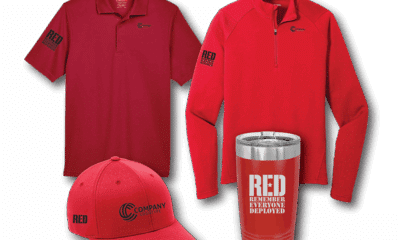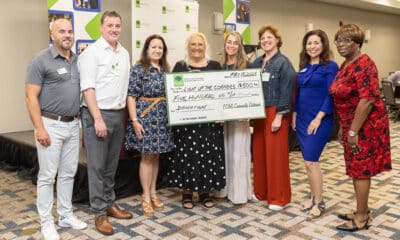Business
Learn How One Dental Practice Navigated the COVID19 Locked Down and Reopening
Published
5 years agoon
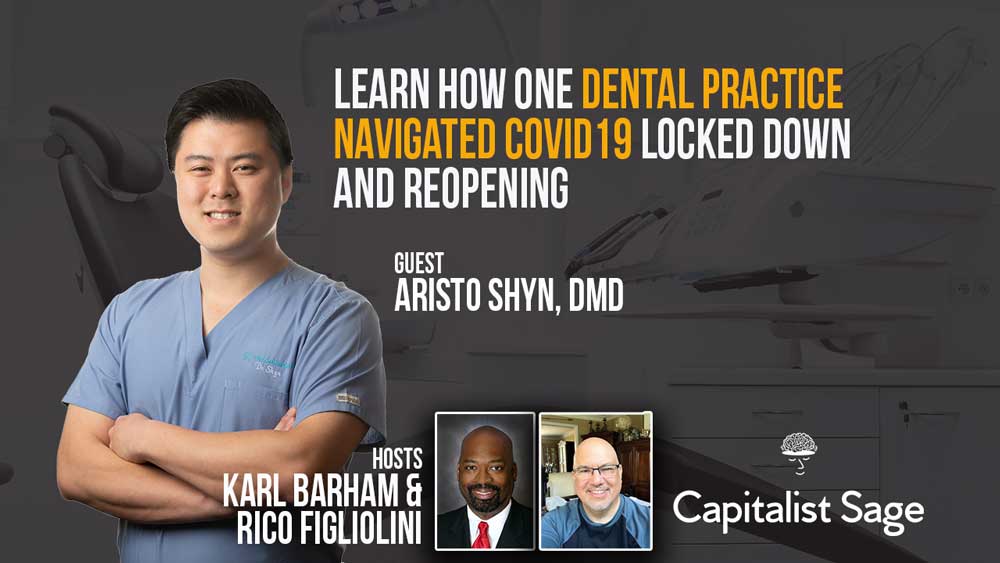
Today on the Capitalist Sage, Karl Barham and Rico Figliolini are joined by Aristo Shyn DMD, the owner of Link Dental Care in Peachtree Corners. Dr. Shyn has been working hard to make sure that his clients and patients, as well as his staff, remain safe during this COVID time. Listen in to hear how he has re-imagined what his dental practice does.
Resources:
Phone: 770-448-1977
Website: LinkDentalCare.com
Social Media: @linkdentalcare
“I think it’s so important for people to have confidence in you, whether that’s your own staff or the patients. And I’m not talking about just dental treatment, but you know, during these times they need to have confidence in you that they’re safe and that you’re being transparent… And people having trust and confidence in you, I mean it’s not a responsibility that I take lightly.”
Aristo Shyn, DMD
Where in the show is that topic:
[00:00:30] – Intro
[00:01:59] – About Dr. Shyn and Link Dental Care
[00:04:59] – Advantages of Private Practice
[00:05:31] – First Impressions
[00:06:55] – Safety
[00:09:40] – Other Challenges
[00:13:01] – What Went Well
[00:15:45] – Staying Healthy
[00:19:20] – Future of Dentistry
[00:26:02] – Industry Help
[00:27:30] – Closing
Podcast Transcript:
Karl: [00:00:30] Welcome to the Capitalist Sage Podcast. We’re here to bring you advice and tips from seasoned pros and expert to help you improve your business. I’m Karl Barham with Transworld Business Advisors and my cohost is Rico Figliolini with Mighty Rockets, Digital Marketing and the publisher of the Peachtree Corner Magazine. Hey Rico, how are you doing today?
Rico: [00:00:48] Hey, Karl, very good. You’re doing well?
Karl: [00:00:52] We’re doing well. It’s Friday, so we’re getting into the weekend. And we have a bonus episode of the podcast today, but first, why don’t we introduce our sponsors?
Rico: [00:01:02] Sure. So our lead sponsor is Hargray Fiber. Hargray Fiber is a large Southeast company providing fiber optic solutions to small businesses and large enterprise businesses. As well as bundle services and even tools like smart office that helps with tele-working. It helps with companies and their employees either onsite or offsite. So they’re a big partner with businesses, as well as the communities like here in Peachtree Corners. They’re involved with Curiosity Labs at Peachtree Corners, with the city, with a lot of organizations like Atlanta Tech Park. They’ve been a sponsor of the cyber health tech event that just recently happened. So they’re involved in the community. They’re not the cable guy. They’re the company that provides real good service to you and they are right in your community. So check them out at HargrayFiber.com or Hargray.com/Business. And you’ll be able to see what they can do for you.
Karl: [00:01:59] Fabulous. Well, fiber optics and everyone that’s doing all this homeschooling. And even as we’re broadcasting virtually, it’s becoming a critical part of everybody’s life. So, please do check out Hargray Fiber if you need fiber-optic and internet service in Peachtree Corners and surrounding areas. Today we’re continuing in our series talking to local business owners that are reopened, that are operating their businesses and being successful in navigating keeping people safe yet still providing them the services that they can. And today we’re honored to have as our guest, Dr. Shyn, the owner of Link Dental Care right here in Peachtree Corners, in Gwinnett County. And he’ll talk to us a little bit about how he’s been navigating his business and his team and his clients through the COVID-19 pandemic. From before, what had happened and through the reopening and how he’s keeping people safe and just, you know, being a small business owner in the community, helping us serve the clients. Thank you Dr. Shyn, and why don’t you start off by introducing yourself to everyone?
Dr. Shyn: [00:03:14] Absolutely. Before I start, I wanna say it’s an honor to be on a podcast whether I be on Joe Rogan.
Rico: [00:03:25] I only wish.
Dr. Shyn: [00:03:28] Yeah, but my name is Aristo Shyn. I’m the owner of Link Dental Care. We’re currently in our eighth year of business. And we offer comprehensive dentistry to our patients, meaning that we’re ready for your routine dental cleaning and fillings all the way to
more involved procedures having to do with cosmetic or implant dentistry. As far as a little bit about myself, I was born in Kansas City, Missouri. I grew up in Alaska pursuing a golf career. And then moved to Florida to finish my dental training. So, luckily my dentistry turned out better than my short game. And I’ve been in Georgia since 2012. And, you know, as it says on my bio on the website, I am very happy to be away from grizzly bears and hurricanes.
Karl: [00:04:22] Fabulous. And so since you came to Georgia, what made you think of opening a practice here in the Peachtree Corner area of Georgia?
Dr. Shyn: [00:04:31] Well, I was looking for, looking to go into private practice in the Metro Atlanta area. I kind of lucked out ending up in Peachtree Corners. It turned out to be a good move, I love the area. And you know, for me personally, I had to you know, get out of corporate dentistry and start my own private practice.
Karl: [00:04:59] What are some of the things that you’ve enjoyed about, private practice, things that have been, that you liked about that?
Dr. Shyn: [00:05:08] Well, you have autonomy. You’re able to offer your own set of standards and define your standard of care. And, you know, it does come with, you know, responsibilities and some stress as I think all business owners experienced this year. But you know, for me, I wouldn’t have it any other way.
Karl: [00:05:31] No, that’s fine. I find that with a lot of small business owners that there is a freedom and it’s also fulfilling because you could be more connected into your community very often here locally when you’re a small business owners. And I think a lot of people like that, it’s being able to support small businesses. Well, this year has been a really tough year for small business owners, but I’m curious, when did you first hear about COVID-19 and what were your first thoughts when you started hearing about it and how it might impact you and your clients and your business?
Dr. Shyn: [00:06:10] Well, I mean, this is a bit of a blur, but I think we first heard about it, I first heard about it early in the year. Maybe January, February. And I didn’t really put much thought into it. And then, it became a very real situation very quickly.
Karl: [00:06:30] Yeah.
Dr. Shyn: [00:06:31] Yeah. You know, overall, I think we’re still on a roller coaster. I’m not sure if this ride is over yet, you know. But, you know, overall I’m very grateful to be working, thankful to have a staff so well prepared, and very thankful to our patients who have been some of the most loyal people you can ask for.
Karl: [00:06:55] I’ve got, so a family member that work in healthcare and hospitals and different. And I remember early on there was a lot of guidance through the CDC and other public health
services to help them be prepared to protect themselves and their clients. I was wondering, what were some of the things, as you started to learn about it that you had to do differently to keep yourself and your employees safe as well as your clients?
Dr. Shyn: [00:07:25] Well, we’ve had, we’ve expanded on protocols that we’ve already had in place. I mean, us being a healthcare setting, a medical setting. We were already familiar with OSHA guidelines. But you know, in addition to that, we have modified how patients check in. For example, you know, your parking lot is the new reception room and we’ve, I mean, we’ve taken out, you know, most of the chairs in our reception area, we’ve taken out all magazines. We’ve taken temperatures for everyone that’s walked in the reception area. We have, I forget how many air purifiers we’ve installed, but we’ve installed a bunch of them. We’ve been monitoring how many people are in the practice at one time. So we’ve set a cap on maximum capacity. We’ve installed high speed suction systems, and all additional high speed suction systems and all offertories. Disinfectants all over the place and obviously a PPE vent. You know, everyone’s talking about how we’ve lucked out a little bit with PPE. So I think, I’m pretty sure I left out a few items, but that’s yeah. It’s been, that’s been, that’s what’s been happening.
Rico: [00:08:47] You know, just for transparency, I am a patient of Dr. Shyn’s. Just recently although my family has been going to Dr. Shyn for a little while. So I can attest to some of the things that Dr. Shyn is saying. So I walk in, you know, I get, I have to call, I have to before I even come in, I get temperature checked. And, you know, the staff is there to be able to make you feel comfortable. And I certainly felt that. And certainly Dr. Shyn has made me feel comfortable there as well. So, I think you’re doing the right thing. I certainly saw a big difference between, you know a normal pre-COVID dental practice and then the post-COVID dental practice. And all the safety precautions. So the air purifiers are the biggest thing that stood out to me along with, you know, the M-95s and the other stuff that, you know, everyone has to wear, you know, in the medical profession, so.
Karl: [00:09:40] I’m curious about some of the challenges that you faced besides having to implement more safety procedures. What about for clients’ behaviors? Communication? What have been some of the challenges getting people comfortable with rescheduling their appointments and starting to meet. Probably you might’ve experienced some pent up demands.
Dr. Shyn: [00:10:03] Sure. Well, you know, we had two phases of challenges. The first one was during the actual, you know, we were shut down for almost two months. That, we had that phase and then we had the challenge of getting everyone caught up and you know, scheduled after we reopened. So I mean, during the shutdown phase, I was really focused on what’s gonna happen with my staff, my existing patients and how we’re going to deal with dental emergencies. And you know, we always kept the phone lines open, even during the shutdown. I kept in touch with my staff. We kept in touch with our patients, whether that was over the phones, or through emails. And, you know, I think we did pretty good accommodating dental emergencies during that phase. It wasn’t easy, but you know, we don’t take dental emergencies lightly. And another thing that I did during the shutdown was I actually opened, I actually did
virtual and telephone consultations for anyone who had a dental emergency or dental question. And, I even gave out my contact information to the Norcross cooperative industry and even our local church. So that was a pretty cool thing. And we didn’t take a penny for that obviously. I mean during, after opening, you know, we extended hours. We extended, we expanded staff. We expanded hours and now we’ve been, pretty much as busy as ever.
Karl: [00:11:47] Okay. I’m curious, sometimes you go through something like that. And most people have never experienced, an event like this. But you do the best you can with the information and the resources that are provided to you both local level, government level, et cetera. Looking back in hindsight, you could play armchair quarterback. Are there things you think, you saw other businesses doing or you might’ve considered that if you knew what you knew now you could have done quicker or better before to kind of prepare. And if something were to happen in the future, any learnings from that?
Dr. Shyn: [00:12:28] You know, besides, you know, picking up more PPE before this. Yeah. You know, honestly, given what we’ve had to deal with, how, you know, all of us got blindsided. I don’t know if there’s a whole lot I’d do differently. I think our team pulled through it and did a decent job in handling this.
Karl: [00:13:01] What about the flip side? What do you think, you know, this sometimes through things like this, it creates opportunity, in multiple levels. What are, are there anything that you think that went right and either during and now looking forward, what are some of the things that make, might have helped both the business, your clients, your staff.
Dr. Shyn: [00:13:25] Well, I want to say that it’s, I think it’s so important for people to have confidence in you, whether that’s your own staff or the patients. And I’m not talking about just dental treatment, but you know, during these times they need to have confidence in you that they’re safe and that you’re being transparent. And I mean, a lot of these can apply, I think to us, you know, not just during this period, but you know, during all times, but right now I think it’s more important than ever. And people having trust and confidence in you, I mean it’s not a responsibility that I take lightly.
Karl: [00:14:14] Yeah. I think you’re hitting on something really key there. When we collectively go through times like 2020, bringing, coming together as a community, both business community and the local community is really important. And it’s times like that, where you could actually build more trust. Because people need each other and people are trying to find ways to help. And I’ve been so impressed what the local community has done. The schools are providing food for kids, people helping with learning. I see, pod groups of students now where with distant learning, people are helping each other. You’re seeing drop-offs happening at neighbors houses. But even if you think about it in your practice and so on, it’s figuring out ways to communicate with folks and help continue to build a trust when people are uncomfortable. I’m curious, if somebody was really still uncomfortable with going to get health care, dental or others, any advice you have for people that might at home still be really uncomfortable. They
may feel that they’re more vulnerable than others. Is there any advice you can give to those folks? And as far as that, they’re trying to make that decision on seeking help and care and doing some of the things like going to a dentist eye doctor, et cetera.
Dr. Shyn: [00:15:45] You know, it’s, the data is all over the place right now. And I don’t think anyone really has a firm grasp on how transmissible this is and what the do’s and don’ts are. But, I mean, I can speak. You know, where a mask, have hand sanitizer on you. And you know, I can speak for our office in that, I mean, we’ve taken every reasonable, feasible, option there is in order to make sure you’re safe inside the office. So, yeah. That’s, that’s all I have.
Karl: [00:16:26] Yeah. You know, I think you’re hitting, you know, reminding people of that. Social distance when they can, wear a mask. I recently saw something where it talked about the transmission rate when both people are wearing a mask, drops down to single digits, two, three, four, 5% versus both people not wearing mask. And it’s a hard change for people to implement. But what, I know, for my family and I, and folks that we talked to. We’re looking at the community good at this. And the sooner we can get the transmission rate down and whatever tactics it takes, the masks, the social distancing, the hygiene. To do that, allows people that may not be comfortable to go back and see their dentist and kids to go back to school and people to continue to live their lives and support local businesses. And so we’re in a challenging environment because I know everyone isn’t on the same page with that. But, it’s been shown as people started implementing that you can continue to get back into normal activity, normalized activity. Sure, it’s awkward, because you may have to wear a mask more then you like, but I think it’s so important that we try to protect folks like yourself and your staff by doing what we can as a community to lower the transmission rates. So you could do and serve your clients as well as we can. So that’s always something that’s good to remind people of.
Dr. Shyn: [00:18:12] Long story short, we’re going overboard until this thing is completely cleared out. So that’s, that keeps things simple.
Rico: [00:18:24] You know, it’s interesting because especially in your profession versus any other right? Pizza place that delivers pizza, you do the curbside pickup, whole different animal than, than even a doctor’s office, a physician that’s where both patients are wearing masks unless there’s a temperature check. You know, an oral temperature check, I guess. In your place, you know, you have to feel comfortable a patient with opening their mouth while they’re sitting on that chair to be able to do that. You know?
Dr. Shyn: [00:18:54] Sure, sure.
Rico: [00:18:55] So, you know, I had that…
Dr. Shyn: [00:18:57] I’ve tried to do dentistry with a mask on it’s, when the patient has a mask on it doesn’t work out too well.
Karl: [00:19:05] A little innovation, right?
Rico: [00:19:10] I’m thankful that you guys go overboard though.
Dr. Shyn: [00:19:13] I’m good, but not, not that good.
Karl: [00:19:20] Now, I’m just curious about your thoughts on the future of dentistry. If you’re thinking into the future, this will pass at some point. Do you think this will have a lasting impact in any aspect of dentistry in general, in your practice in particular?
Dr. Shyn: [00:19:38] Well, I think going forward, we’re going to be more aware than ever regarding, I mean, our industry and any healthcare industry, we’ve been dealing with, I mean the Common Flu, HIV TB. So, you know, this is another virus that we’re dealing with. But I think after this phase most, if not all, dental practices are going to be safer and more aware of safety guidelines than ever before. I think that that’s going to be at least one positive effect from this year.
Rico: [00:20:20] Let me ask you, you just brought up a good point. I was at a physician’s office a few weeks ago, actually my wife was. And, you know, the front staff is always the first to be exposed to anything. And you brought up like TB and flu and stuff like that. You know, before this, I just never thought about it. You know, a patient walks in, who knows what they have? That’s why they’re there because they’re not feeling well. And they’re in there because they want to find out what’s wrong with them. They could have that. They could have TB, they could have the flu, they could have COVID, they could have anything right? So changing the way we, I guess COVID has really helped to look at that.
Dr. Shyn: [00:21:02] I think it’s brought on a lot more awareness across the board outside of healthcare. But you know, there are some rules that we’ve always followed and that’s to treat every patient as if they’re infectious. So, like I said, I think you know, it’s something that our industry has been dealing with. But I think, you know, we’re gonna, I mean, we spent a great deal of time focusing on this and I think, you know, we’re gonna come out, you know, more refined and more aware of these issues than ever before.
Karl: [00:21:38] When I look around the world, other parts of the world that have dealt with viruses before, it was interesting to see when this happened, the response time to it, and the people were more prepared because there’s a memory. I know our children are growing up in this 2020 we’re wearing masks and social distancings and washing their hands is becoming a very normalized part of life. And I could see this experience will prepare us in the future if other things like this, you know, I’m sure people will always have masks now in their house and we’ll be able to start implementing it. I think people will look at cleaning hands, which helps with the flu anyway, and so many other things as a more regular thing that they do in their daily practice. And so sometime these types of experiences who forces us to prepare for the future, not just individually, but I’m pretty sure the government and local authority, they’re having protocols and
they’re rewriting playbooks and stockpiling certain things so that they can, you know, if there was a surge they can respond to it quicker. I think we were collectively, you know, we just never thought that this would be a problem, but once you get stung by something like this, I don’t know if that we can, we could forget it.
Rico: [00:23:11] Yeah. And you know, I haven’t spoken to a lot of different businesses. It’s really interesting to see how everyone has looked at COVID-19 through the lens of their business, their industry, and how they’ve all been and able to succeed. Maybe to pivot a little bit, I mean, in your business, it is a business, right healthcare, you haven’t had a need to pivot. You just have had to challenge on how to progress. How to step forward through this, whereas other businesses may have had to pivot. They may have had to change the way they do business or even change their business entirely because they’re not making it. Restaurants that are closing, restaurants that become ghost kitchens all of a sudden, because you know, they’re just doing deliveries. I don’t think I’ve, I mean, there’s certainly restaurants open now with dining rooms, for example. But there are restaurants that are still closed dining rooms. Chick-fil-A still only does curbside and drive through pickups. They don’t do dining room. So you have, to me your business is way more challenging because there is no other way to do this like you said.
Karl: [00:24:18] Right.
Rico: [00:24:19] Have to step right through it. And you have to find that and meet those challenges head on and do it well.
Dr. Shyn: [00:24:25] We can’t do virtual either.
Rico: [00:24:28] No, you can’t. You can do a little tele-health, like you said, but you can’t reach through the screen, right?
Karl: [00:24:34] But, you know, even if it involves all the adjustment, the fact that people are more sensitive with symptoms, coughing and fevers and these types of symptoms. Self screening at home, I suspect most people, if they knew they had a fever in 2019, they might still show up for their dental appointment. And today, you know, that would be something that people would even before you have to screen them self select and say, I’m not feeling well. Let me reschedule my appointment. So I don’t impact your employees and others. And that behavior shift could help us keep healthier in general. You would argue that would’ve probably been the right thing to do. I remember people being, road warriors and proud of showing up to work every day, whether they were sick or not. That was 1980. That was a pride thing for people to do that. And now over the years, it started dying away. No, if you’re sick, it’s okay if you stay home. Jump on your computer and protect the rest of the office. And so maybe some of that becomes a legacy of this, where people are just taking more responsibility of protecting others because this COVID-19 dealing with a very immediate instant where that was necessary. But, I think hopefully that helps as we go into the future.
Rico: [00:26:02] Have you gone through anymore, you know, the industry has conferences and such. Conventions and seminars and stuff. Have you, obviously now it would be virtual. Have you seen any or taken any that has helped at all?
Dr. Shyn: [00:26:20] As far as?
Rico: [00:26:22] Any, any industry wide.
Dr. Shyn: [00:26:28] Oh yeah, sure. I mean, yeah, I mean, we, I had a lot of free time for a while. So, you know, we took a lot of, I think a lot of CE, virtual courses on dentistry itself, managing, you know, COVID. But you know, we, I mean, we’re still, we’re constantly getting bombarded with information from the CDC, world health organization, American dental association, Georgia dental association. So, you know, we’re keeping up with those guidelines on a regular basis.
Karl: [00:26:59] That’s excellent. So I’m curious, one of the things during the time when you were closed down, I wondered if you got to play much golf during that time or that an activity that you can do and stay social distance.
Dr. Shyn: [00:27:15] I thought that was going to happen. There’s no chance with a newborn.
Karl: [00:27:22] Oh, you have a newborn?
Dr. Shyn: [00:27:24] Yeah. I think, thank you. I think golf is gonna be on standby for awhile.
Karl: [00:27:30] No I understand. Well, I wanted to at least, thank you so much for joining us today. And, if folks wanted to reach out and talk to you some more and, what’s the best way for someone to reach you?
Dr. Shyn: [00:27:45] Best way would be by phone. My number is 770-448-1977. And our website is LinkDentalCare.com and you can find it on there as well.
Karl: [00:27:59] Excellent. Well, we’ll put those in the show notes. I’m curious you know, going into the fall season and I know you’re probably super busy catching up. Do you have anything going on? What do you have going on over the next several months?
Dr. Shyn: [00:28:13] Well, we’re gonna, you know, my focus is to keep doing what we’ve been doing. What’s worked for us, not just this year but for the past several years. And I want to highlight that we are focusing on not just new patients, but also making sure that all of our existing patients are taken care of. And I also want to make sure my staff is taken care of as well so I will continue to invest in the patient experience. I will continue to invest in my staff and continue to be involved and give back to the local community as I have been.
Karl: [00:29:04] Well, I just want to thank you small business owner, helping to protect the community and serve the people here in Peachtree Corners and Gwinnett County. And the many others like yourself that are doing that is what really continues to drive our economy as well as really help us navigate through this. So thank you so much for all that you’re doing and we want make sure that you’re successful. So thanks for joining us today. Our pleasure, our pleasure
Rico: [00:29:36] Hang in there as we sign off too.
Karl: [00:29:39] I’d like to thank Dr. Shyn, the owner of Link Dental Care here at Peachtree Corners for sharing your experience, going through 2020 and everything else that we’ve done, that we’ve been doing over this past year in the community and just being one of those business leaders that are, that is out there doing their part. So thank you for that. I’m Karl Barham with Transworld Business Advisors of Atlanta Peachtree. What we do every day is work with business owners to help them with either evaluations on their business, helping them grow through acquisition in purchasing other businesses, or when they’re ready helping them with finding a buyer and selling their business. Transworld Businesses Advisors you could reach us at www.TWorld.com/AtlantaPeachtree, office here at Atlanta Tech Park. If you want to stop by and say hi, we do see people by appointments still. But we try to keep everyone safe. Rico, why don’t you tell us a little bit about what you’ve got going on?
Rico: [00:30:38] Sure. So I’m Rico Figliolini, I published Peachtree Corners magazine. We do that six times a year. We’re working on the next issue now, which should be fun. It’s a pets and their people pull out center spread. So, if you’ve got pictures of you and your pets, you know, we’re doing a giveaway starting out next week, you know, feel free to participate and we’ll be pulling pictures from that, for that center fold pullout spread. We’re doing an article about backyard retreats, you know, everyone’s sort of stuck at home to a degree still. You may not be traveling. So maybe that backyard fire pit and stuff like that could be of interest. So we’re exploring some other people’s backyards to see how they’ve done theirs. And we’re going to be doing something we’re going to be calling curating together, things that people are thankful for this year. Cause even with COVID-19 Karl, I mean, we were all thankful, certainly for our families. Friends, things that we do in life. So just want to be able to see what individuals are thankful for maybe beyond their family and friends and what they see as positives and thankful for. So we’re going to be covering some of that. Mighty Rockets is my company. You can find me at MightyRockets.com. You can look me up on LinkedIn at Rico Figliolini. If you can spell that out, I think you will get quite there almost. I do, I handle companies and corporations that need social media content work, product videos, podcast productions, and such. So feel free to reach out to me. And one last thing I just want to say thank you again to our lead sponsor Hargray Fiber that helps make these family of podcasts happen.
Karl: [00:32:16] And what about the last Peachtree Corners magazine? It’s out there people can check it out.
Rico: [00:32:22] My goodness, yes. I think I’ve had calls for this publication, you know, we’ve mailed more copies than ever before. So we’ve mailed 19,700 copies on this last issue. And because of COVID, we’ve had to contract the amount of places that we can place this. So I have people calling me up, where can I find copies? I mean, literally, I just like, can’t put out enough copies. I don’t have any more copies to put out and people are still calling me cause they can’t find the copies that we’ve put out. They’re gone already. So I’m happy. It was a great issue. Karl you’re a good subject matter as well, you’re in there. So we’ve covered diversity in this issue, along with health and wellness in Amber field community. And so a lot of good stuff in here, so.
Karl: [00:33:12] Excellent. And you can also find online at…
Rico: [00:33:14] Yes, LivingInPeachtreeCorners.com. If you go there, not only will you find the family of podcasts in the tabs at the top, but you’ll be able to read the digital edition as well.
Karl: [00:33:26] Fabulous. Well, Rico continue doing what you’re doing. It’s great to see, all these stories and meeting our, learning a little bit more about our community and the people that live here, that work here, people that play here. And in the upcoming months we’re going to see a bridge be finished in Peachtree Corners. So folks get to go explore more parts of Peachtree corners. So thank you everyone. Stay tuned for the next episode of the Capitalist Sage. Take care.
Related
Business
Music Matters Productions Expands Peachtree Corners Headquarters
Published
1 week agoon
May 21, 2025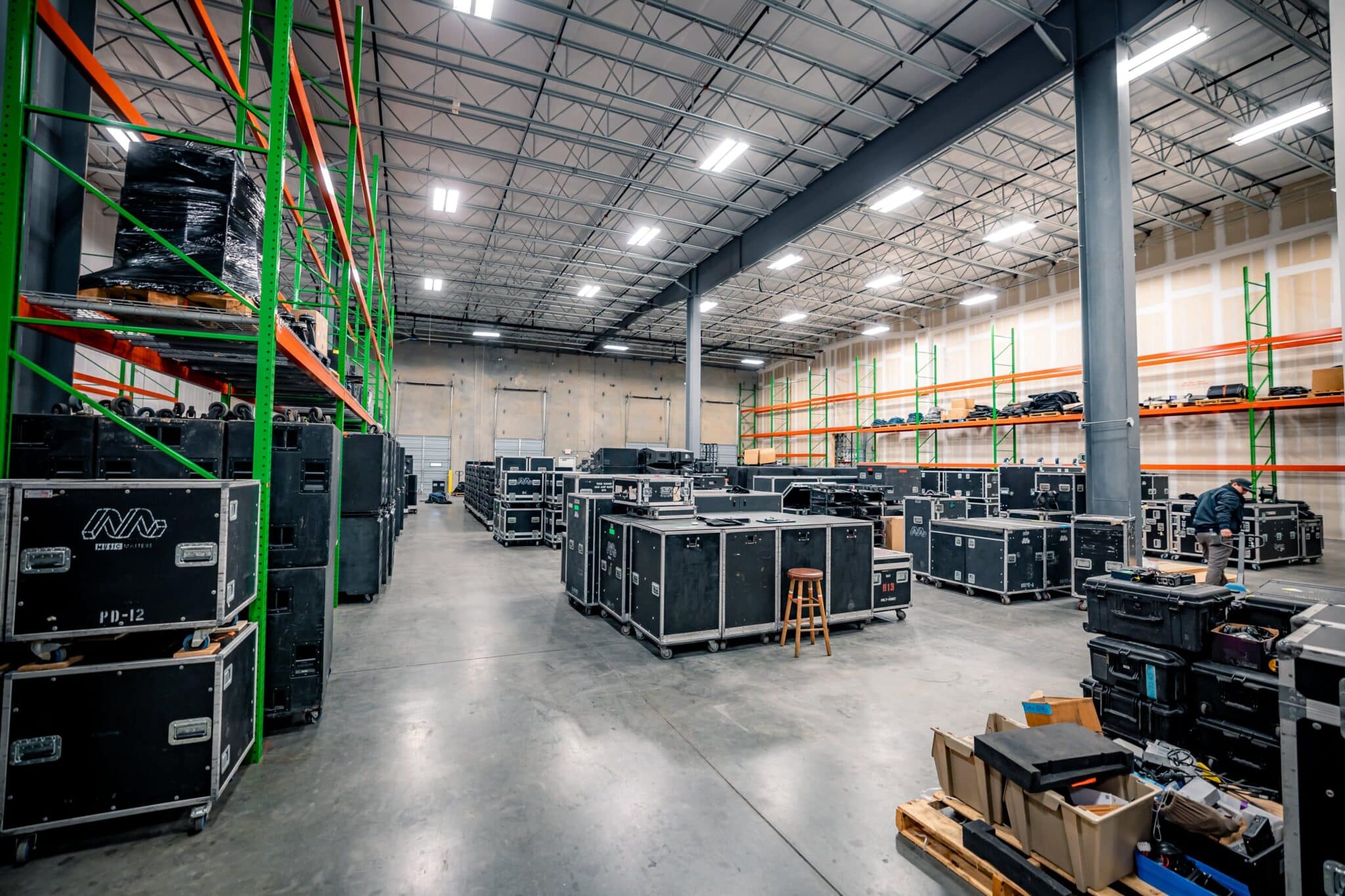
Company adds 20,000 square feet to meet growing demand
Music Matters Productions (MMP), a premier provider of audio, lighting, video, staging and rigging solutions, has expanded its metro Atlanta headquarters, increasing the total warehouse footprint from 40,000 to 60,000 square feet.
In addition, MMP has opened a second 10,000-square-foot building directly across the street to house its growing corporate production division.
The expansion comes in response to increased demand across touring, festival and corporate markets, as well as the continued growth of MMP’s high-end gear inventory. With a fully dedicated shop for each department, including audio, lighting, video, rigging and staging, the new layout provides more space for show prep, pre-rigging and crew coordination, allowing for even more efficient load-ins and streamlined execution.
New features
The rigging department now features a new mobile motor hoist test stand, allowing for in-house motor certification, a service that’s now available to external clients in the production community.
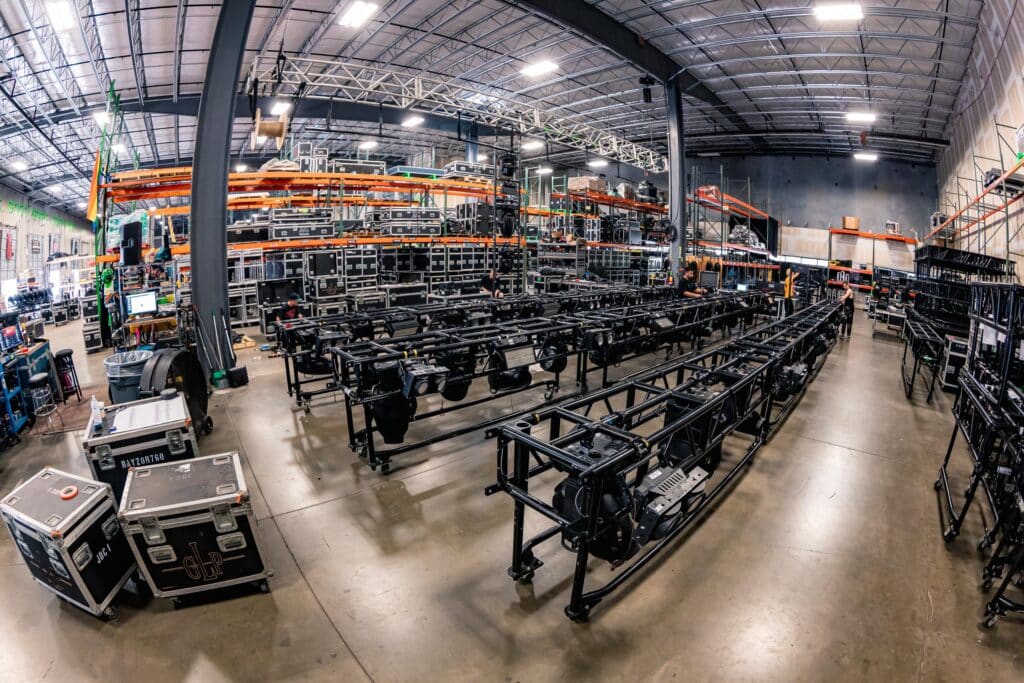
Five new truck bays were added in the process, as well, bringing the total number of bays to 17 — an important upgrade for MMP’s fleet and the increasing number of shows moving through the warehouse each week.
“This growth is a direct reflection of the work our team puts in and the trust our clients place in us,” said Aaron Soriero, owner of Music Matters Productions. “We didn’t expand for the sake of being bigger, we expanded because we needed the space to do the job right. More room means tighter prep, faster turns and better support for our clients.”
Expanding operations
The expanded warehouse and building across the street include additional offices, mixed-use areas and a dedicated repairs department, giving the team more capacity to prep, collaborate, QC and scale for increasingly complex events — both corporate and entertainment.
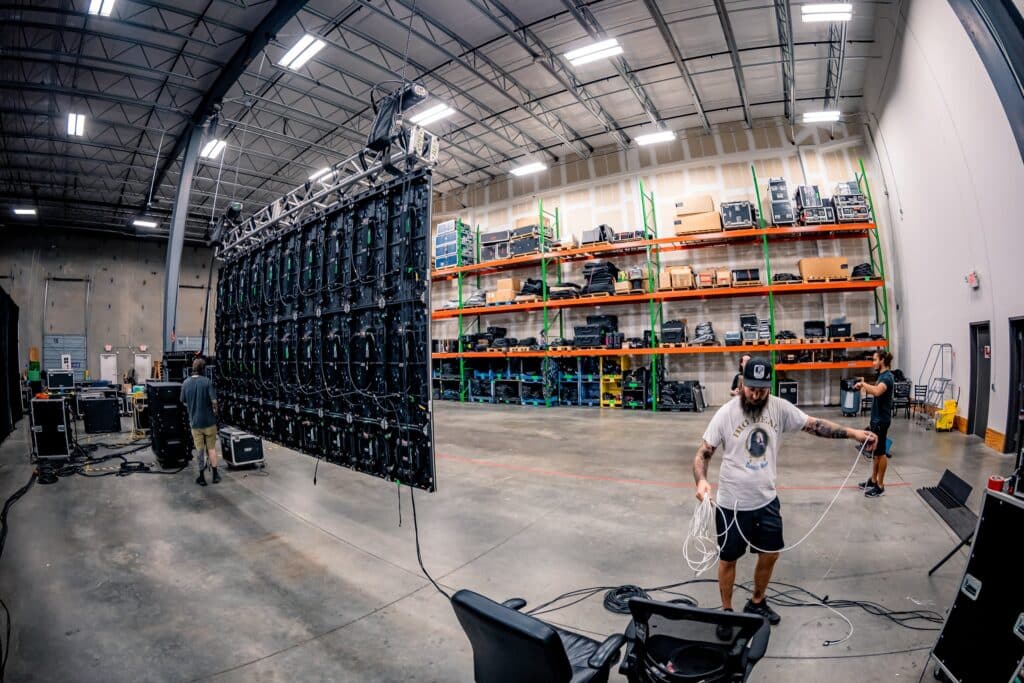
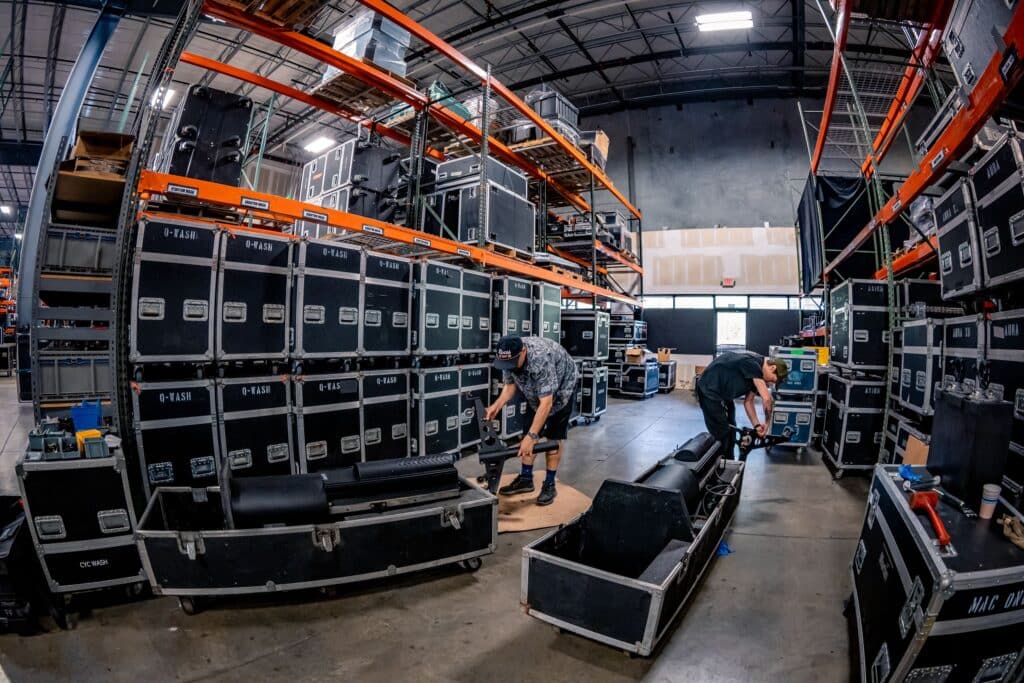
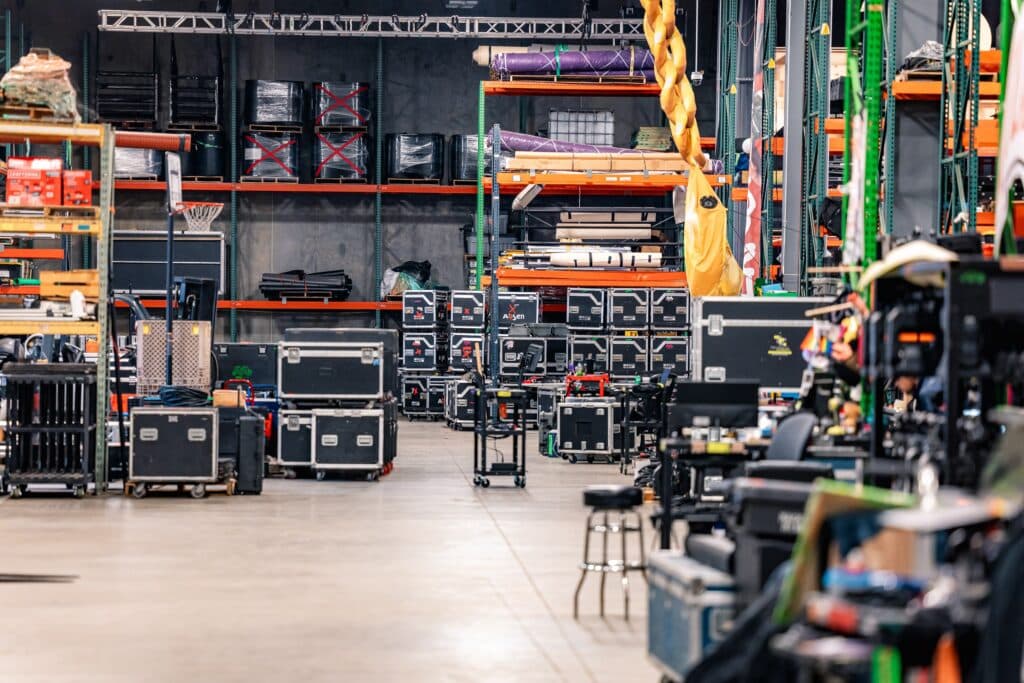
With a reputation built on reliable gear, experienced crews and an enhanced client experience, MMP continues to solidify its role as a go-to production partner for events of every size and setting — whether it’s a beachside festival, a stadium tour, brand activation or a high-stakes corporate show.
About Music Matters Productions
Music Matters Productions is a full-service live event production company based in Peachtree Corners, Georgia, providing industry-leading audio, lighting, video, rigging and staging solutions for tours, festivals, brand activations and corporate events across the country.
Known for its high-end inventory, seasoned crew and deep dedication to doing the job right, MMP supports hundreds of productions each year and is trusted by clients nationwide.
For more information, visit mmp-atl.com.
Related
Business
From Boardrooms to the Himalayas: Vandana’s Journey to Purpose and Growing with Intention [Podcast]
Published
2 weeks agoon
May 19, 2025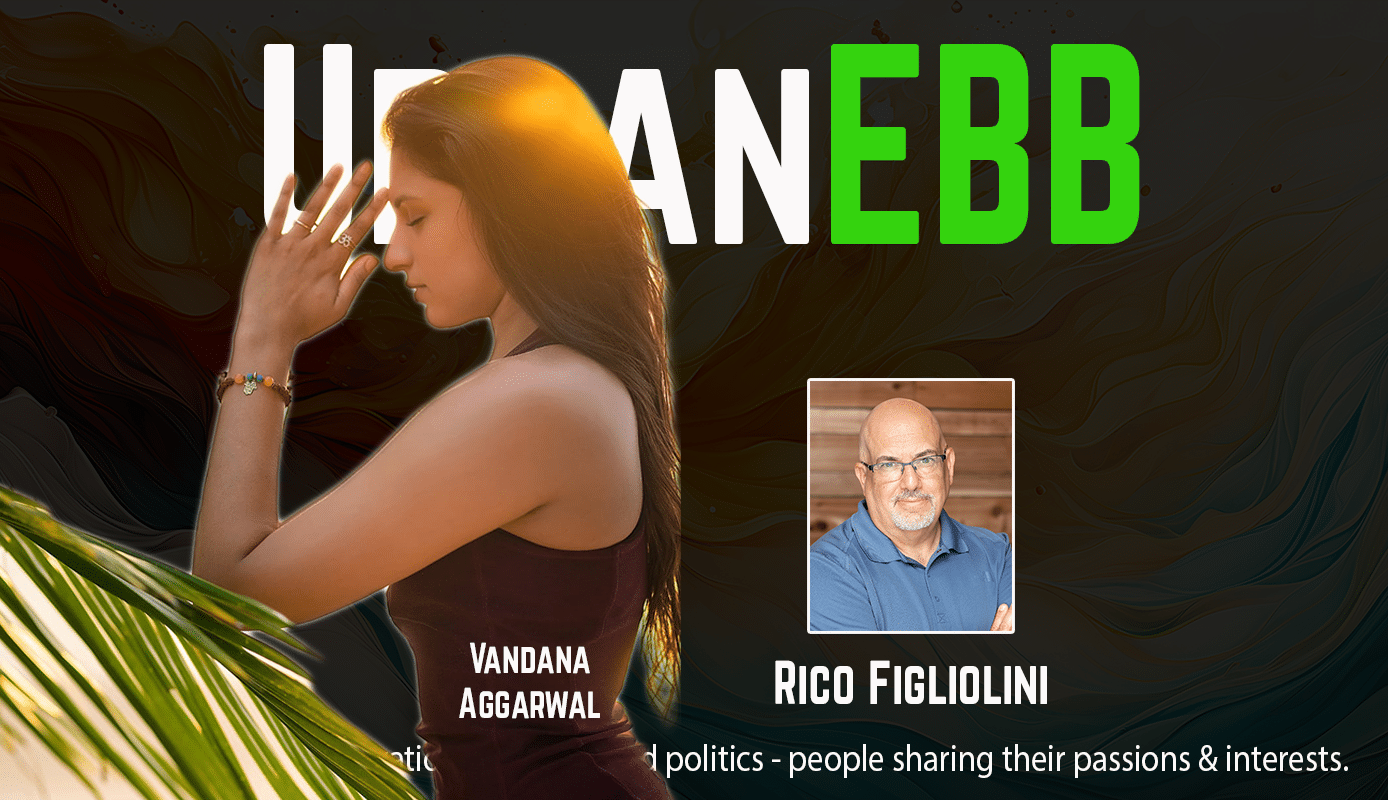
How one family blends operational clarity, conscious leadership, and community-driven values to grow their business — together.
In this episode of UrbanEbb, host Rico Figliolini chats with Vandana Aggarwal, VP of Operations at Aggarwal Real Estate, about the winding road from global consulting to family-run commercial real estate in Norcross, Georgia. With honesty, warmth and insight, V shares how she went from working 80-hour weeks in corporate strategy to rediscovering clarity in the mountains of India — ultimately helping transform her family’s business into a community-driven real estate firm managing over 50 shopping centers.
The conversation weaves together themes of leadership, legacy, operational excellence and the transformative power of both AI and yoga. It’s a story about clarity, courage and conscious growth — both in business and in life. This is another episode you won’t want to miss.
Episode Highlights
- Why Vandana left a high-powered consulting career to join her family business
- How hiking Kilimanjaro and studying yoga in the Himalayas changed her leadership mindset
- The operational overhaul she brought to Aggarwal Real Estate to support growth
- What it’s like working side-by-side with your dad, siblings, and 700+ tenants
- How the company rebranded with intention and built a mission around “building communities as a community”
- Where AI is reshaping real estate—from lease drafting to property management—and where it still can’t compete with people
- Leadership succession planning with siblings at the helm
- The importance of clarity, calm, and conscious growth in both business and life



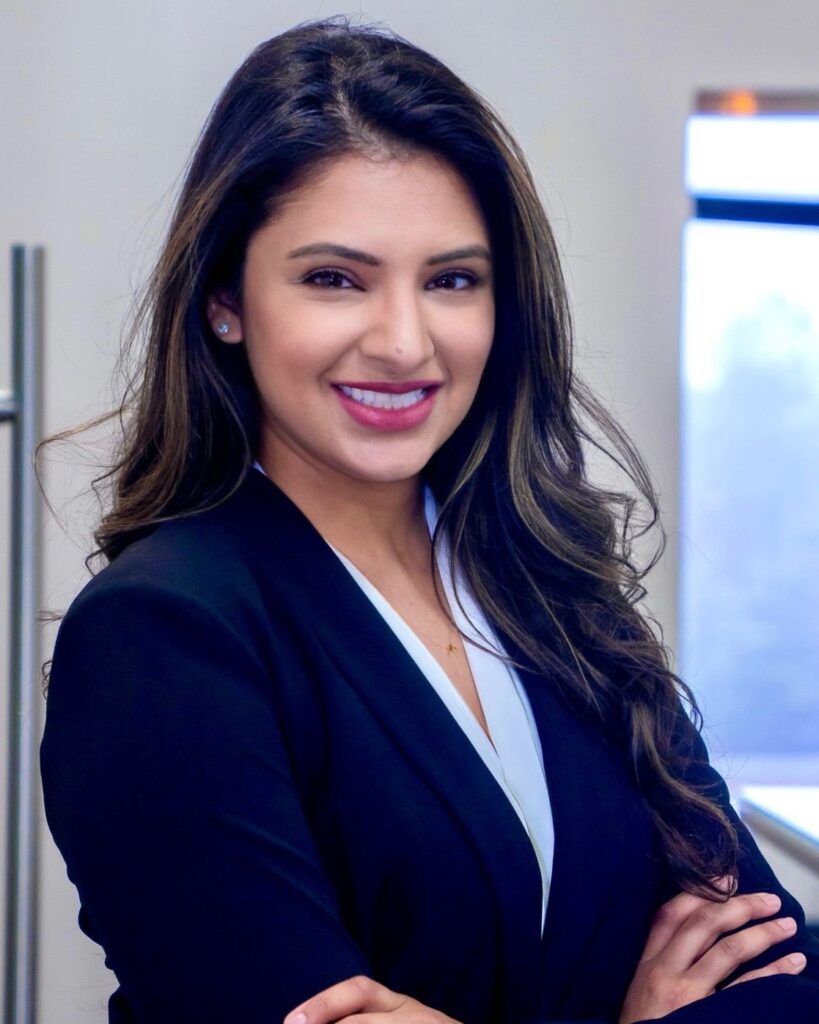




About Vandana Aggarwal
Vandana Aggarwal is the Vice President of Operations at Aggarwal Real Estate, her family’s commercial real estate investment and management firm. She brings a unique blend of strategic insight and operational excellence, shaped by her early career as a consultant at A.T. Kearney, where she advised Fortune 100 to 500 companies. A graduate of Georgia Tech, she also took a transformative detour from the corporate world to spend a year in India teaching yoga—an experience that continues to influence her leadership style today. At the core of her work is a deep commitment to family and a passion for building strong, connected communities.
Timestamp:
00:00:00 – Introduction and sponsors: Vox Pop Uli & EV Remodeling
00:03:12 – From Georgia Tech to global consulting
00:04:23 – Leading strategy for Fortune 500 companies
00:06:11 – The role of vision alignment at the C-suite
00:08:01 – Sabbatical becomes family business overhaul
00:09:35 – Bringing operational excellence to a growing real estate firm
00:12:02 – A year of yoga, nature, and healing in India
00:17:03 – Hiking Kilimanjaro, testing limits, and expanding self-trust
00:18:52 – Navigating family dynamics inside a business
00:21:56 – Planning for leadership transition: siblings, strategy, succession
00:24:06 – Rebranding the business: from American Management to Aggarwal Real Estate
00:26:33 – Where AI fits (and doesn’t) in real estate operations
00:30:04 – Legal, leasing, HR, and marketing efficiency with tech
00:31:01 – Community-focused retail and experiential shopping centers
00:32:00 – Reflections on AI, journalism, and digital trust
00:32:57 – Closing thoughts
Podcast Transcript
00:00:00 – Rico Figliolini
Hi, everyone. This is Rico Figliolini, host of UrbanEbb. This podcast comes out of the city of Peachtree Corners, and we have a special guest today. And if I don’t mess up the name, it’s Vandana Aggarwal.
00:00:15 – Vandana Aggarwal
Absolutely. You can call me V, Rico.
00:00:15 – Rico Figliolini
I’m going to call you V, trust me. And I’m Rico Figliolini, so a bit of a long name there. But V is VP of Operations of Aggarwal Real Estate here, based in Peachtree Corners? No, Norcross.
00:00:30 – Vandana Aggarwal
In Norcross, yeah. Norcross, Georgia.
00:00:32 – Rico Figliolini
Yeah, yeah. Just off 85, and?
00:00:34 – Vandana Aggarwal
Jimmy Carter.
00:00:35 – Rico Figliolini
And Jimmy Carter.
00:00:36 – Vandana Aggarwal
We’re completing each other’s sentences already.
00:00:39 – Rico Figliolini
But where are we doing this? We’re doing this from one of our great sponsors, one of our two great sponsors, Vox Pop Uli. Was this tastefully obnoxious? Let me tell you, I asked them to do a corner cut for us, and this is perfect. So they have the Moxie logo and stuff. So they’re branding, right? Same way they can brand your stuff. They’ll put your logo on anything. They’ve done, I think, 6,000 vehicle wraps. They’ve done garments, obviously. They could do one-offs or they could do 1,000. They do trade show booths, wraps, everything. So anything you need a logo on, think of what object you want it on. They’ll figure it out for you. And if you’re doing, let’s say, 5,000 mailers and you want that database customized for each postcard, they could do that also. It’s called data. I forget what it’s called, but they can do that. They can work the data into the printing as well. So all customizable. Check them out, voxpopuli.com. Now, getting to something we were talking about, hands-on stuff, which is this also. This can’t just be done by machines, right? Although machines, you still need people. But EV Remodeling Inc., they are a remodeling company. They can do design to build. They can do whole house renovation. They can create your deck, your backyard gazebo. They can put a bathroom, kitchen, anything you want. EV Remodeling Inc. is owned by Eli and his family. Lives in Peachtree Corners. It’s based out of our city. They’ve done, I think, over 250 homes recently. So check them out, evremodelinginc.com. And I want to thank both of them for being great sponsors of ours. So, it’s always a long stretch doing that, but I’m glad to have you, V.
00:02:22 – Vandana Aggarwal
I’m happy to be here. Thank you for inviting me onto your podcast. Excited to chat with you.
00:02:25 – Rico Figliolini
Yeah, no, this is cool. Well, you know, I met you, where did I meet you at? I think it was the chamber.
00:02:30 – Vandana Aggarwal
Yeah, the Southwest Gwinnett Chamber event.
00:02:32 – Rico Figliolini
Yeah, and we were talking a bit, and I was like, damn, you know, I had my father owned a business, and he wanted his kids to be in it. None of us, none of us could go into that business. It’s a little difficult, different industry. It was a hard industry, plus my father was very patriarchal, very over-demanding. God bless him. He mellowed in age. But when you were telling me about your family, I mean, your father, your mother, your sister, your brother, and you, I mean, all in it. It’s amazing.
00:02:55 – Vandana Aggarwal
We’re all together. We’re the modern-day Brady Bunch.
00:03:03 – Rico Figliolini
I love it. Yes, that’s exactly it. But, let’s start a little bit. I mean, you were telling me, I mean, you came from a consulting world. You came where you were actually being paid a lot more than you’re being paid right now, actually.
00:03:12 – Vandana Aggarwal
I told my father he couldn’t afford me when he recruited me out. So I graduated from Georgia Tech in 2007. I actually did join his company right out of college for two years, learned a lot about the company. He actually had me go through a rotation in every department of the company to learn more about what we did, how we operated. And I think very quickly, it was also 2008-9 with a recession. But I was also very interested to learn how big companies operate. How can you take a small company at that time? We were much smaller than we are today and really understand how do you go from this, which is where everyone starts, right? As a new company to get to be one of the largest in the nation, in the world and see how they operate, how they grew it from, you know, a mom and pop business to this global enterprise. Consulting was a natural transition to learn about multiple companies, multiple industries. So transitioned into AT Kearney, which has now been rebranded as Kearney, and out of their Chicago office. So I was there for seven to eight years, almost eight years.
00:04:23 – Rico Figliolini
Entry-level position you got in?
00:04:24 – Vandana Aggarwal
Yeah, I went in as an analyst. The good thing with that experience was by the time I left, I was a senior manager with Kearney. I worked across 17 different companies in those eight years. So I got to experience how CPG companies, retail companies, transportation, IT, you name it, I’ve done it. In terms of the different types of industries I got to work with, worked with a lot of Fortune 100 to 500 companies at the C-suite level. So we were coming up with all kinds of strategy projects such as new market entries, mergers and acquisitions. A lot of what I ended up specializing in in those seven years was operational efficiency and growth strategy. So it was an amazing, I’m grateful for that learning experience, the you know the caliber of minds that you work with. You also get to experience what the C-suite looks like. How does the very top operate and then it goes from the top down right? So it is very much led at this very top leadership and you see how companies change in their culture the way they operate based on how the top is designed.
00:05:38 – Rico Figliolini
So did you see good and bad at the top?
00:05:41 – Vandana Aggarwal
Absolutely. And I’m not going to name names. But you learn a lot when you see how your CEO and your C-suite right below them, the culture they’re bringing into a company and their vision and their goals if they’re aligned, unaligned. Anyone that at the very top have different viewpoints of where the company has had it is where companies start to break apart, lose revenue, lose their you know people, which is very important.
00:06:11 – Rico Figliolini
Where did you see the pain point then? What was the common denominator I guess of those?
00:06:18 – Vandana Aggarwal
There’s no one common denominator, but if I had to kind of narrow in, it comes down to what is our five-year, ten-year trajectory? Where are we headed? As large companies grow, you’re not just in one industry. You’re not just doing retail shopping centers. You’re investing in all kinds of properties just to bring it back to our company. Similarly, a CPG company can make all kinds of products, so they have to decide what it is because you have to be concentrated on the right places. If you have a leadership team that is in alignment of what that ultimate goal is, right, then you have clear strategies and, you know, metrics you’re measuring your success against. So that was a big thing that I learned. Also just, you know, seeing how great leaders operate, right? Some of the best in the nation today, I got to be in the room with them and just to see how they lead is very important.
00:07:14 – Rico Figliolini
Did you see any family dynamics in any of those businesses?
00:07:20 – Vandana Aggarwal
No. You know, there may have been like a father-son duo, but when you’re looking at the very top, I won’t say it was like all in the family, right? You know, and it also becomes the size of a company, right? You know, when you get to an international scale, you’re not always blessed that every person in your family has the right skill set and experience to fill each role on that C-suite.
00:07:46 – Rico Figliolini
I’m just thinking Trump for some reason. Every kid has a job.
00:07:51 – Vandana Aggarwal
Every kid has a job.
00:07:52 – Vandana Aggarwal
You had the accent, right?
00:07:54 – Rico Figliolini
Pretty much, I guess. So after the C-suite or expansion, you traveled a lot too, I think, right?
00:08:01 – Vandana Aggarwal
I did, yeah. So after my seven, eight years in consulting, I was reaching 30. And Shiv, my father, came to me and he said, you know, you’re doing this for a lot of outside companies. Why don’t you help us grow and bring your expertise home? And I said, look, I’ll take a sabbatical. Let me assess the company. And after that period where I took a short sabbatical to come look at how we were operating, I said, I can give you three years. I said, you can’t afford me, but I’ll give you three years of my time. And I said, I think it’ll be the right, it was the right time in the company. We were investing very heavily. We were bringing in a lot of new square footage into the company, and we weren’t designed to manage it. So we as a company, as you know, we are the investors. We have an in-house management company, an in-house leasing company. So as we acquire new properties, our team does the management for those properties in-house. We don’t provide third-party services today. And we do the leasing in-house. But at that time, when he, you know Shiv started we had one or two and now we’re at 50 shopping centers plus and other investments that we have. And there’s a very different way you operate you know and how do you how does the CEO go from being an operator to where he’s overseeing it, but he’s not into the weeds right? So he has create a system for that to happen right? You have to have standard operating processes for your property managers, your accounting team, your marketing team.
00:09:35 – Rico Figliolini
And you quite didn’t have that before.
00:09:37 – Vandana Aggarwal
We didn’t, no. And, you know, and I think that’s why he wanted to bring me in is because my strength is operations and I love it. I love going into messy places and cleaning them up.
00:09:49 – Rico Figliolini
Is that what you did when you were a consultant?
00:09:51 – Vandana Aggarwal
A lot of what I was concentrating on at the end of my consulting career, yes. So I did a lot of operational efficiency work. So we’d go in, assess the way companies were designed. And we’d interview hundreds of team members to understand what their role is. You know, what are they responsible for? How are they delivering? What are they measuring for success? And then we’d redesign the way they did that based on, again, bottom line, what are your ultimate goals for the company?
00:10:21 – Rico Figliolini
So you had to understand that before you got to that point. And you’re not making the decisions, the C-level.
00:10:29 – Vandana Aggarwal
Present, right? And similarly even with Shiv, when I first joined, I said, look, this is how I think we need to redesign the company from a bottoms-up perspective based on ultimately our goal of growth, doubling, tripling in size over the next ten years. And I think this is where the father dynamic came in. I guess he trusted me. And he said, do it. He just said, do it. And it was beautiful because right when you’re with large companies, it’s a lot of time before you get. Those decisions made and that trust, right? And so it was great. And he said, yeah, just put it into place.
00:11:07 – Rico Figliolini
See, that’s a great dad, actually. Some dads would be like, I don’t know about that daughter or son or whatever.
00:11:16 – Vandana Aggarwal
It did take time, though, like to ultimately, he was in the operation so heavily. And, you know, until today, I’m still like, step up, step up. Like, I need you to not get into the weeds. Like I think at that time we had tenants calling him, maintenance guys calling him. Like every little and big problem would go through his cell phone. I said, you’re too smart and you’re such a good investor. This is not your skill set. You shouldn’t be managing this. You need to bring people on who are expertise in this area. And I said, you need to be focused on like the larger plan.
00:11:51 – Rico Figliolini
This way you can grow it better.
00:11:51 – Vandana Aggarwal
Which I think has been very successful over the last eight years I’ve been with him now.
00:11:57 – Rico Figliolini
So before you got to him, though, you were traveling a bit internationally as well?
00:12:02 – Vandana Aggarwal
Yeah, yeah. So this is an amazing year. I was very burnt out. By the time I left consulting, I was working 70 to 80-hour weeks, traveling Monday through Thursday, if not more than that, of the week. So I told Shiv, I was like, I’m going to take a month. I’m going to go to India, get my yoga certification. No intention to teach at the time. I just said it’d be a great one-month retreat. And I was up in the mountains like Himalayas and India in a city called Dharamshala. Beautiful place. One of my favorites in the world. And I just, I think I needed it for myself emotionally, mentally to take that break. So I turned one month into one year. I didn’t know it was going to be a year.
00:12:49 – Rico Figliolini
In that same city? In that same town?
00:12:50 – Vandana Aggarwal
Yeah, so I ended up the school that I had gotten my certification with. I asked them, I was like, do you mind if I hang around for a little while? Like very casually, I’m like, you know, I’ll pay for my room and board, but I just want to be around this group and this energy. And they said, well, if you’re going to be here, why don’t you intern? And they’re like, room and board is free if you intern. I was like, sure. You know, not thinking what it was leading to. This is like that beauty of the universe coming into play. Yeah, so I started teaching, ended up loving teaching. So then I ended up teaching the 200-hour yoga training course. And I was in Dharamshala for four months. And then I moved down to Goa, their Goa campus for another six.
00:13:30 – Rico Figliolini
Where is that? Goa?
00:13:32 – Vandana Aggarwal
Goa? It’s in southern India on their west coast. It’s a beach town. Yeah. So I had the mountains and the beach. But I’m a mountain girl. I’m a hiker. But no, it was a beautiful experience. Very different from anything I’ve done with my career, right? But I became a yoga teacher for a year.
00:13:52 – Rico Figliolini
Did that clear your head? Yoga, they say, can do that, right?
00:13:53 – Vandana Aggarwal
Yeah, it’s all the tools of yoga, right? The meditation, the breath work, really getting internal, going in, right? Just going inwards, being quiet, which we don’t have. We have a lot of noise in our life today, you know? And naturally, right? Between family life, work life, social, and then just all of the noise from everything else right? Like we’re sitting here and I can hear the cars right? So you know that difference was when I was sitting there, I could hear the ocean waves and so there’s something very healing in nature naturally. So it was the tools mixed with nature and I still think nature has a very strong healing power on us. So whenever I can, I try to get out on a mountain and by the ocean. But yeah no it was it was a beautiful experience but it did bring a level of calmness into the way I approach things. It changes your perspective of you know at the end everything’s okay. No matter what you’re going through it’s temporary you’re, and everything that’s happening to us is happening to us for the good. We don’t know it, sometimes it seems like a bad situation in the moment, but ultimately you know, universe, God, whatever you believe in is at play to bring you something better in your life. And you just have to step back to understand what is it delivering us.
00:15:19 – Rico Figliolini
I like the way you think. My wife every once in a while would say, aren’t you upset about that? I’m like, I think come tomorrow, it won’t mean anything. There’s no point in, just relax. Not everything, two days later, it’s not as important as it seemed at that moment.
00:15:37 – Vandana Aggarwal
Yeah. And it’s not just that it’s not as important. It’s also like…
00:15:41 – Rico Figliolini
In perspective?
00:15:42 – Vandana Aggarwal
It’s, what am I gaining from this? Like, what can I gain from this? Oftentimes when, you know, a lot of things happen, yeah, like you get hurt or, you know, it’s like in relationships, right? Or if you have a bad business deal, right? It’s like, hey, how am I growing, right? And I think that’s what makes life very exciting, right? Otherwise, if you’re always living on a high, is it a high?
00:16:06 – Rico Figliolini
Yes. So I’m thinking you were a consultant for seven or eight years. 80 hours a week. And all of a sudden you’re doing yoga on the mountains of India. It’s just like, it’s almost like a movie. It’s almost like…
00:16:18 – Vandana Aggarwal
Eat, pray, love?
00:16:19 – Rico Figliolini
Yes.
00:16:20 – Vandana Aggarwal
It was my eat, pray, love moment for a year.
00:16:23 – Rico Figliolini
That’s amazing.
00:16:24 – Vandana Aggarwal
No, you meet amazing people, but I think we were meant to meet everyone that we come in interaction with on a daily basis. You naturally have a connection. There’s a universe at play, and we were meant to cross paths and learn something from each other, gain something from one another, give to the other person. And I think you just have to look at life that way.
00:16:48 – Rico Figliolini
I definitely think along that way. I mean, I definitely think each of us nudges each other in a crowd a little bit. That one nudge can set you off going in a different direction. So I totally believe in that. So you joined your dad. Yes. And you’re, so actually, even before we get there, so yoga, but what other interests have you been?
00:17:03 – Vandana Aggarwal
Yeah. So, I mean, I’m an avid hiker. I’ve done recently in the last few years, I’ve climbed Kilimanjaro. I did the Machu Picchu trail. I’ve done a few 14ers out in Colorado, but I like to test myself physically. You know, just, again, it comes down to how do we find that push within us past our comfort zone? So is this a physical inability or is it a mental constraint? So to get past that mental constraint of discomfort and then really push yourself to the next level and say, I can achieve something. It’s not going to be easy. So to me, if I’m on a hike and it’s not hard, I’m like, well, was it a hike? Like it didn’t test me, but no I think, you know.
00:17:55 – Rico Figliolini
You should do the Appalachian Trail. That’s like 2000 plus miles.
00:18:03 – Vandana Aggarwal
I know. And it is, you know, it’s not just like the hiking part. It is like living out in nature and, you know, sleeping in uncomfortable conditions. Yeah. Walking in the rain. It’s cold. I think the last day of our Kilimanjaro hike, it was negative 20 degrees up in the mountain and my eyelashes were frozen and I couldn’t feel any part of my body. And, you know, and it tested my breathing. And there is that element of push yourself to the point that it’s not your ego anymore. Like if your body’s saying stop, you have to stop as well and respect your body. But yeah, to really test yourself.
00:18:38 – Rico Figliolini
To circle all that back now, you’re back home. You’re working with your father and your family. A lot of businesses grow or die because of family. If it’s a family business, right?
00:18:52 – Vandana Aggarwal
Absolutely, yeah.
00:18:53 – Rico Figliolini
So you have your highs, your lows, your, sometimes you don’t get along. Sometimes decisions are split. People get upset with each other. So you’ve been at your highs and lows physically and mentally doing other things. Has that helped you in some ways? Not that you’re having a bad time with family. Because it sounds like you all fit just fine, like the Brady Bunch.
00:19:15 – Vandana Aggarwal
Let’s keep it that way. No, I mean, there’s multiple dynamics at play. It is a family business. My father is also my boss. My siblings are also my friends and my coworkers. And it’s about no matter how hard you try, you cannot separate those relationships. There is an interplay of all of it when you spend eight to nine hours a day together. But we all have, again, a common goal for the company. And then a common goal for our personal relationship. So when we sit down, we keep in mind that we like each other and we want to keep it that way. Like very simply put, that’s first and foremost for me especially. Even when Shiv had brought me in, he said, oh, can you manage everyone? And I said, I’ll manage everyone but my brother and sister. I said, you know, like I won’t jeopardize the relationship I have with them as a sibling by being their manager. Especially because I said that’s your job like good luck. But not just that it’s you know we all have different skill sets so I said how do I manage my brother who is a genius he’s a CPA by trade you know like I can’t tell him how to run the financials of this company like he’s supposed to teach me that right? And same way I teach him that. My sister has a master’s in marketing right? She is by far the most social, likable person you’re going to meet, and she knows how to work with people. I said, she needs to teach us that. So I think we’re lucky that each of us, and this is, I think, rare, where you have three kids and each one of them has their own skill set. That, I think, helps us stay in business and we see ourselves foreseeably into the long-term future being in business together is because we each bring something very unique to the table. Ultimately we value the relationships that we have on a personal level as a family above all else right? And then you know the element of like, how does the yoga experience a hiking experience teach us. That’s, it’s not specific to anyone’s situation, I think it’s a baseline of who you become right? The foundation. Like it teaches you patience, it teaches you again, everything is temporary so let’s not get overly attached emotionally or get upset or too joyful, even like, let’s just stay neutralized on any situation because it will end. And then the next one will come up and kind of flow with the ebbs and flows of the ocean. You, you flow with everything that comes with you, comes your way at work, at home. But yeah, I mean, we do sit down as a leadership team. I, my father and my siblings and I, and we talk about, hey, we separately do the exercise. Where are we going to be in five years? What role do we play in that journey? And thankfully, all of ours are very similar in what our goals are. And then we have different skill sets that we bring. So even as we design the future of the company in a moment where my father is not at the head of the table, we’re working on that redesign work. But it’s very conscious. It’s very intentional. Again, we all step back and say, hey, look, how do we maintain, how do we solve problems? Because like, you know, we were talking about how tomorrow we may not agree on something, a big decision. What are we investing in? Come back to, you know, right now Shiv gets to make an ultimate decision because he’s the one leader at the top. Tomorrow it’s going to be three people at the top. How do you deal?
00:23:04 – Rico Figliolini
So is there an exit plan for your dad? Well, not an exit plan.
00:23:09 – Vandana Aggarwal
Not an exit plan. He already has. I think he, you know, he’s gone from, he’s the hardest working person I know. I get that from him. We’re addicted to work.
00:23:18 – Rico Figliolini
80 hours a week.
00:23:21 – Vandana Aggarwal
We love working. You know, this company is his baby. I think I’ve adopted it at this point and we all have. But, to stay mentally sharp, to stay alive, you have to keep working. You have to keep doing something. You have to be working towards something that brings you joy and purpose. And I think, you know, he stepped back to take time towards a lot of his nonprofit work, community work that he’s very much engaged with. But he’s still at the top. He’s still running, you know, his, you know, he’s, you know, not slowing down. You know, we’re constantly growing. We’re growing this year in a large scale, which is amazing, and he’s leading that charge.
00:23:59 – Rico Figliolini
How many properties do you own?
00:24:02 – Vandana Aggarwall
Today we have 50 shopping centers and then a few other assets.
00:24:06 – Rico Figliolini
Is that like 3 million square feet or something? 4 million?
00:24:10 – Vandana Aggarwal
Yeah, over 700 tenants. But, you know, when we sat down a few years ago, we rebranded. Aggarwal Real Estate didn’t exist until two years ago. It was American Management Services. And we had a rebranding effort because we said we want the company’s name and the brand to represent who we are.
00:24:33 – Rico Figliolini
I like that, by the way.
00:24:35 – Vandana Aggarwal
Yeah, it needs to mean something. And we were also proud of what our father has achieved, right? He’s given us this beautiful life that we get to help grow upon. So we said it needs to pay homage to him. So we said, let’s make it Aggarwal Real Estate, ARE. And then as we were deciding what that vision is, we’re a family. In the company, we are a family, not just the four of us, but all of our staff, our team. We don’t, you know, we don’t look at them separate from who we are. And so we said our mission as a company is building communities as a community. And it talks about, hey, in all of the real estate work we’re doing, we try to make sure all of our properties are beautiful. Our tenants are happy. They have direct access to each of us in the company. And on top of that, as a company, we are a community within ourselves because we can’t create them until we are one. So it was very intentional to who we already were, but putting it into brand terms.
00:25:37 – Rico Figliolini
It’s amazing. All that property, tenants. Can’t imagine father tech can send text messages on all their problems, if they have any.
00:25:45 – Vandana Aggarwal
He’s a brilliant man.
00:25:45 – Rico Figliolini
You could be too possessed on that stuff. We want to be cognizant of our time together.
00:25:55 – Vandana Aggarwal
Absolutely.
00:25:57 – Rico Figliolini
So the next subject really was going to be about also AI, because everyone’s talking about AI. We were talking about that before the show started, before we started recording, which was kind of funny because V was asking me if we edit anything. And I was like, no, straight through.
00:26:11 – Vandana Aggarwal
I wanted to see if I could say a few things and then have it taken out of this conversation.
00:26:13 – Rico Figliolini
Nope. Nope. Doesn’t work that way. So, but ChatGPT, AI, that’s all. I mean, you know, could I create a bot to edit this? Probably. But there’s so many things we use in our lives. And you’ve been talking about how it would affect your business. Nevermind the consulting work you did.
00:26:33 – Vandana Aggarwal
Yeah. I mean, the consulting world is, I mean, it depends on the industry, the type of work you’re doing. In real estate, I’ve put a lot of thought behind this. There’s a lot of conversations happening across every industry, every sector, whether it’s education, automotives, real estate, et cetera. Everything’s being discussed. How is that changing the future? How do we incorporate it to be more efficient, right? Be the best in the industry that we can be or operate better. And so for me it’s again comes down to that operations element that I think about like, how do I incorporate it for a company that’s a medium-sized real estate firm today as we become a large company, a bigger player in the market. And people are very important in real estate right?
00:27:17 – Rico Figliolini
Talk about editing?
00:27:20 – Vandana Aggarwal
I was telling you, we should bring them into the podcast.
00:27:27 – Rico Figliolini
We’re going to run a little longer on this.
00:27:36 – Vandana Aggarwal
But let’s take retail shopping centers. This is brick and mortar. I did a paper actually for a large mall retailer back in my consulting days on how the title of the paper was, is brick and mortar dead? And, you know, full circle, I am fully dedicated to brick and mortar, retail, office, multifamily now. But you still need people to clean up your properties, fix your maintenance issues. We were talking about roofing, plumbing, electrical. That is hands-on work. You know, today there is, it’s going to be a long time before there’s a robot that comes in to do that. There will be. I don’t know. I do not see that in 10 years to say we’ve got roofers that are robotic drones that are going to come fix my roof problems.
00:28:24 – Rico Figliolini
Zumbas, they’re going to run around the roof or something.
00:28:26 – Vandana Aggarwal
That’s actually genius. A Zumba for my roof.
00:28:31 – Rico Figliolini
Why not? Attach it to the right thing.
00:28:33 – Vandana Aggarwal
But so those are very people-oriented roles today. Technology will advance how quickly it’s done or how well it’s done. But you’ll still need someone to operate the machinery of it and everything.
00:28:49 – Rico Figliolini
Just not as many.
00:28:50 – Vandana Aggarwal
Yeah. Construction, similarly, right?
00:28:54 – Rico Figliolini
Unless you 3D print a house. I’m sorry.
00:28:56 – Vandana Aggarwal
No, it’s true. It’s true. There’s so many options. I’m thinking 10 years now. I’m not going to have a 3D printer making the metal framing for my new construction project. You know, or installing the sheetrock, it does probably speed up the process, right? There will be machinery to help with that, a lot of AI development in that way. It’s a lot at an office administrative level, right? The speed in which you’re processing invoices, the speed in which you are, you know, getting payments taken in. Today, I would say as far back as right before COVID, we were still accepting checks for money. Now it’s all online. Like we do not accept money coming into the office, or it’s very limited to what we do, right? So that’s AI, if you think about it, right? The ability to pay online.
00:29:42 – Rico Figliolini
QuickBooks Online uses AI now, you can enable it.
00:29:47 – Vandana Aggarwal
So we’ve been using it for many years. The advancement of it has been a little bit slower, and now it’s sped up. Marketing, we were just talking about how you created a flyer on ChatGPT, was it?
00:30:00 – Rico Figliolini
I won’t talk about the student that’s helping us out here and how they use AI.
00:30:04 – Vandana Aggarwal
No, AI in school, right? But yeah, it’s an AI processor for my HR roles, right? Instead of reading 100 resumes, it’s going through the system to filter them out. Whether it’s writing contracts, I won’t lie. Legal jargon is coming out of ChatGPT today. And so it’s speeding up the way we’re doing work. But my legal team probably, and they won’t say it, should be using AI if they’re not. To help create some of this work right? So it’s like these companies are still going to be needed, but the way that they’re able to respond to us at a quicker, everything would just happen faster right? From typewriters to computers, everything.
00:30:49 – Rico Figliolini
Especially if they know that they just did a lease from you for this property in Texas, that we need three more leases done for three other places, it’s not going to be that much different, right? It’s a template.
00:31:01 – Vandana Aggarwal
It’s coming out a lot faster. Yeah, I mean the negotiations, that’s a people-to-people thing right? So I think thankfully in the real estate world we’re still going to need people. We’re still going to need buildings right? The way built, we were just talking about how a retail shopping center is no longer just for shopping. It has to be for entertainment. It has to be for bringing families in and giving them more than just, hey, go into a TJ Maxx and buy something, right? It’s like, what else are you getting when you’re at that center? Whether it’s a play space or events, we’re starting to do more events at our shopping centers. So it’s, again, serving the community.
00:31:39 – Rico Figliolini
We’re seeing that more. More of that happening. We could go on and on here.
00:31:46 – Vandana Aggarwal
Chatting with you.
00:31:46 – Rico Figliolini
Yeah, and we should probably do one on either AI in the marketplace. Or maybe a panel discussion on something similar.
00:31:51 – Vandana Aggarwal
Yeah, overall, yeah. That would be exciting.
00:31:55 – Rico Figliolini
Yeah, I think that would be cool.
00:31:56 – Vandana Aggarwal
I think it’s interesting to learn about kind of where every industry is heading. It impacts all of us.
00:32:00 – Rico Figliolini
For sure. I mean, the magazine business, I mean, it’s all like we have certain, we have AI rules. But, you know, AI is still being used to degree to research things. And to do certain things like that. You know, hopefully journalism isn’t just handed over. They do say 40% of the internet is AI written. So, which is kind of incestuous almost because it’ll just feed on itself at some point.
00:32:27 – Vandana Aggarwal
There’s a whole discussion about the validity and the trust behind digital content. In the next few years. I think it’s going to diminish.
00:32:35 – Rico Figliolini
Oh, yeah. I mean, I’m seeing videos now and it’s just like, it just looks so real. And you could not tell the difference, even voice-wise.
00:32:42 – Vandana Aggarwal
And that’s scary to think. It’s like, how do you trust what you see?
00:32:47 – Rico Figliolini
So on that note, and since this is not edited, so this is right from the beginning. So this is all true. But I want to thank everyone. I want to thank you, V, for being with me.
00:32:57 – Vandana Aggarwal
Thank you so much for having me. This was a great conversation.
00:33:01 – Rico Figliolini
It went by way faster than some of these go. So this is a great discussion. Thank you, everyone. I appreciate you for joining us. Thank you for Vox Pop Uli for the studio look and for letting us do it here, for being a sponsor and for EV Remodeling. Also, I want to thank Jeremy Pruitt behind the camera who has taken care. He’s a Paul Duke student. And it wasn’t him that I was talking about before, by the way. But all the work he’s done on the back end on this. So thank you, Jeremy. So thank you all. Thanks for being with us.
Related
Business
Peachtree Corners Grows Business Opportunities Through Economic Development
Published
3 weeks agoon
May 6, 2025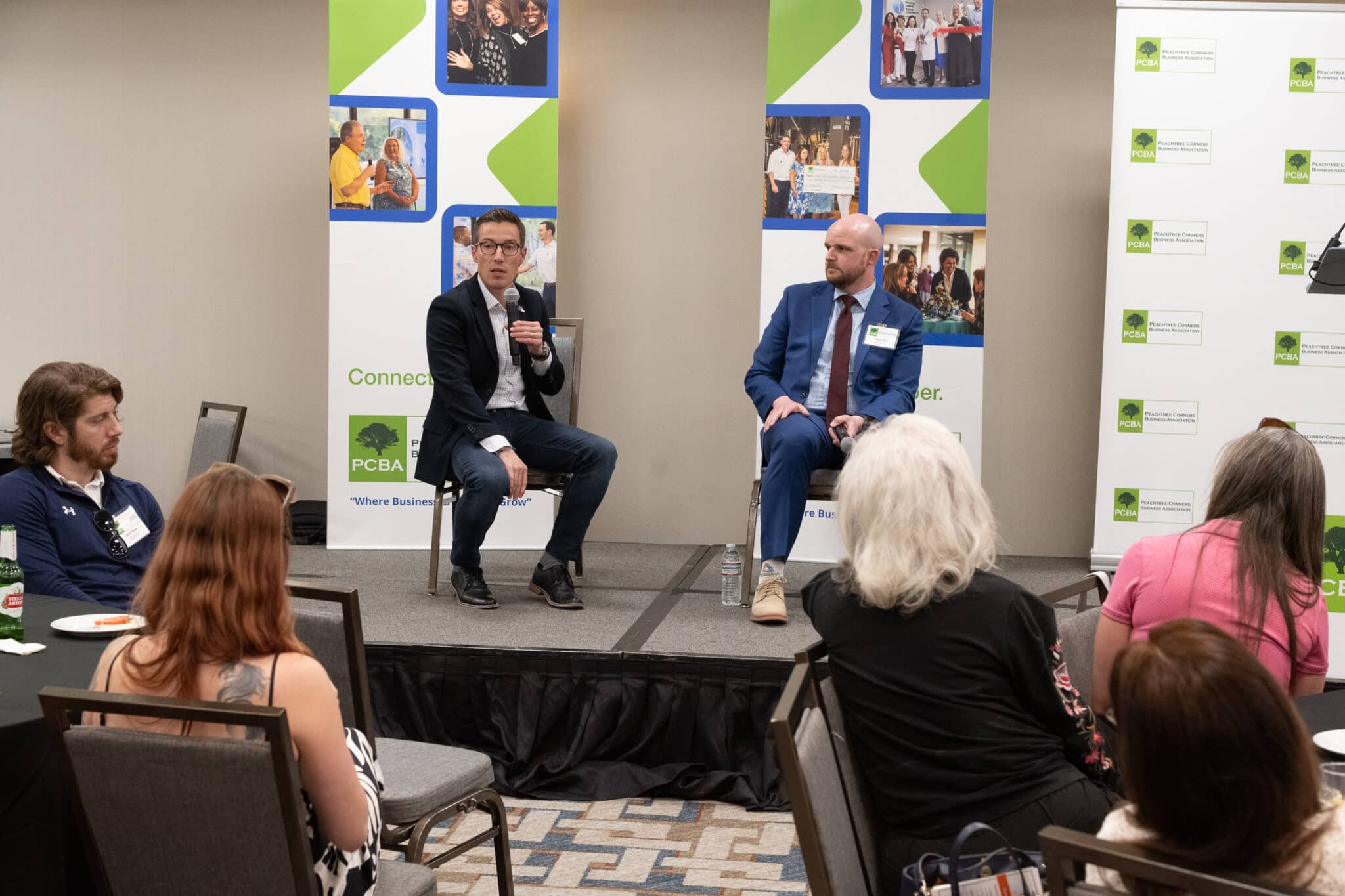
Most residents and business owners in Peachtree Corners probably think they know all about the economic development and strategic planning of Peachtree Corners, but do they really?
Peachtree Corners Business Association invited Peachtree Corners Economic Development Director Betrand Lapoire and Partnership Gwinnett Director of Economic Development Andrew Hickey to its After Hours Speaker Series on March 27 to discuss the city’s growth from a 1971 master plan to a bustling city with 42,000 inhabitants and 40,000 jobs.
Key points included the importance of business retention and expansion, with 24 projects last year creating 1,600 retained jobs, 1,600 new jobs and $250 million in new capital investment.
The Curiosity Lab, a world-class innovation center, was emphasized as a significant attraction. The city’s zoning and infrastructure plans were also discussed, focusing on balancing office and residential development to maintain a vibrant, sustainable community.
Matching jobs to residents
Although Peachtree Corners is just a teenager in terms of being an incorporated city, the foundation for this vibrant, fast-paced economic hub was laid more than 50 years ago by technology pioneer Paul Duke.
“Peachtree Corners was the first master-planned, business innovation technology park in metro Atlanta,” said Lapoire. “It was in response to the brain drain of technology with Georgia Tech graduates leaving the area.”
While the city may have a small-town feel, it’s the largest in Gwinnett County by population, but not land mass, he added.
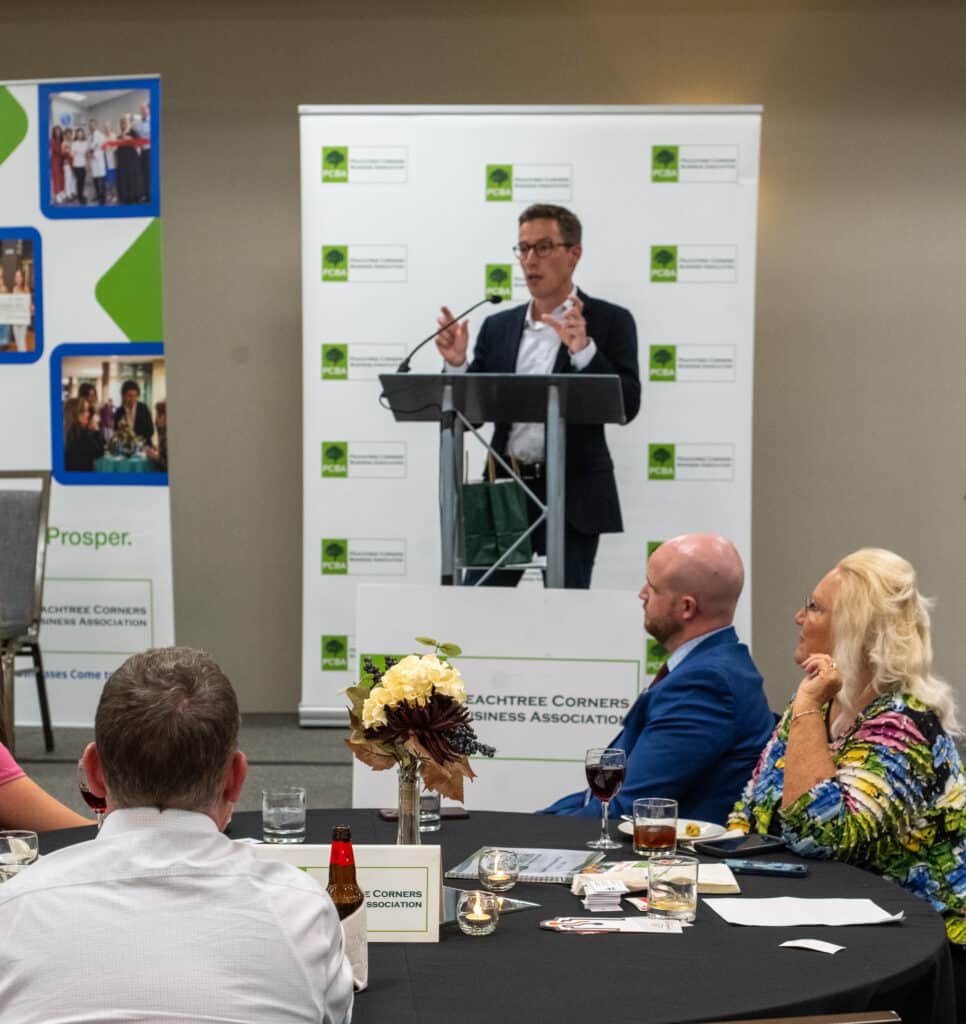
“The city started from a commercial, industrial, R&D base and then was expanded around it,” said Lapoire.
Though home to more than 42,000 residents, most of the jobs in Peachtree Corners are filled by people who live outside the city, he added.
“So we have this interesting mismatch, in a way, although not unusual,” said LaPoire. That creates traffic and transit issues. So that means that one of the solutions is to create more jobs here to fit the profile of the community.”
He presented charts that show professional services, consulting and engineering as the largest job categories. The next tier of businesses are wholesale and manufacturing.
“So we have a good mix of industry,” he said.
A five-year plan
The city has a five-year economic development plan (2023-2028) that outlines strategies for attracting and retaining businesses, with education and workforce development being key components.
Partnership Gwinnett has similar goals as Peachtree Corners, but on a larger scale.
“We are the county’s sales and marketing arm for all 17 cities now, and we receive funding from both municipal sources as well as existing businesses here — both in Gwinnett and outside of Gwinnett as well,” said Hickey.
He shared how Partnership Gwinnett is designed to drive a lot of major corporations toward doing business inside and with Gwinnett County.
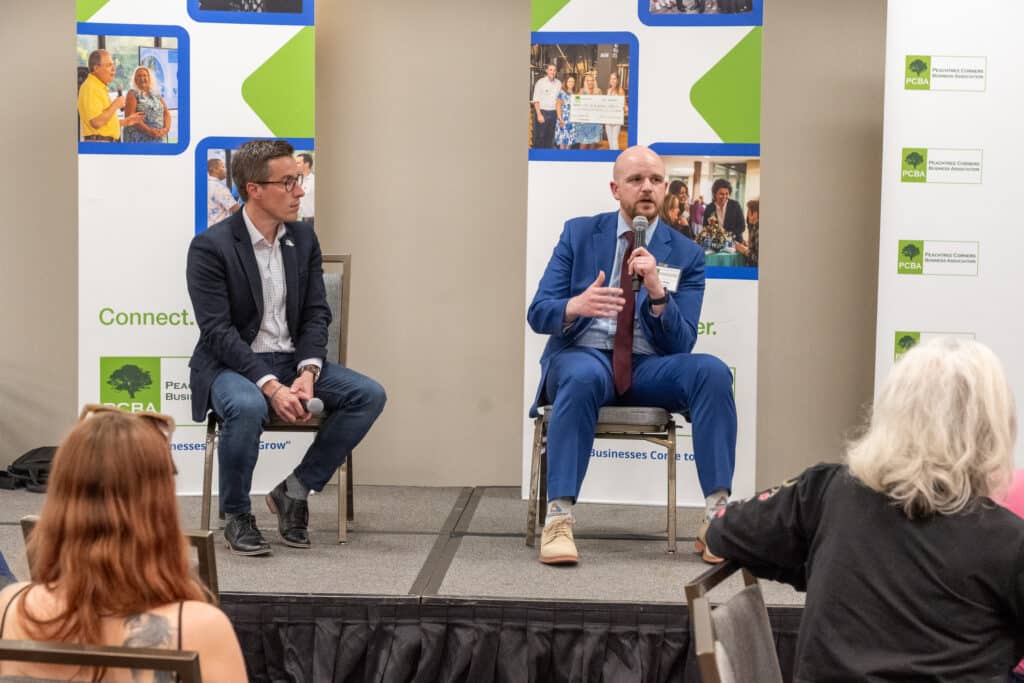
“One of the biggest things that we talk about that I’m sure it seems like most of us here, if you live here, you work here, you understand it. It’s the diversity that exists here in Gwinnett,” he said. “With a diversity index of 85, that means if we walk out of the Hilton here and we say hello to somebody, there’s an 85% chance they’re from a different ethnic or cultural background than ourselves, which to you and I may seem normal because that’s the life that we live in.”
He added that for companies, there’s a tremendous value in that, whether they have stated values, or they’re just making hiring decisions to get a wide range of candidates to fill those roles. Additionally, because of the proximity to Atlanta, Gwinnett County has a great labor draw.
Partnership Gwinnett
Partnership Gwinnett plays a significant role in recruiting businesses, expanding existing companies and developing the workforce. Hickey showed how the organization was involved with more than 24 projects last year.
“A majority of those were expansions, and that is a common thread you’ll see in economic development,” he said. “In business retention, expansion is so vital to working with our existing companies to make sure that they have the resources they need.”
He added that’s what leads to new investment and job creation in the community.
The organization also focuses on redevelopment projects, working with cities and the county to improve infrastructure and community amenities — especially strong educational institutions such Georgia Gwinnett College, Philadelphia College of Osteopathic Medicine and others.
Quality of life
In closing, both men stressed the importance of recruiting companies and developing the workforce, along with one aspect that means a lot but may not be as obvious — quality of life.
“It’s definitely evident that people like to work where they live — the whole live, work play experience,” said Hickey. “I joke that the part that people really have the most questions about, and are most excited to learn about, is new events at The Forum or Gwinnett Place Mall.”
Although they want to know what’s the next major company coming to Gwinnett, people REALLY want to know about how to spend their leisure time.
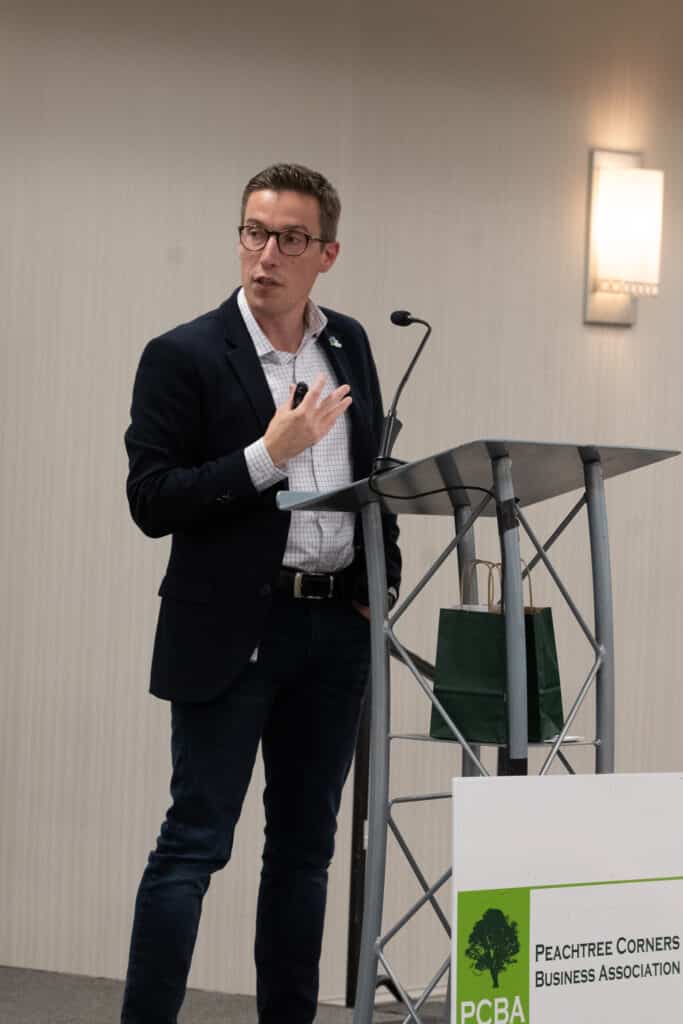
“That speaks to the importance of ensuring that we have a great community,” he said. “So at Partnership Gwinnett we work with all of our cities, and the county government as well, [on] a kind of a best-practices trip.”
He added that the peer tour allows everyone to know what the neighboring communities are doing and share the good news.
“We will take all of these elected officials, but also city staff, to different cities across the Southeast,” he said. “Last year, I believe they went to Huntsville, and have been to Greenville, Chattanooga — all cities that have done some really cool redevelopments that have taken their city to the next level. Our goal is to learn from them.”
Related
Read the Digital Edition
Subscribe
Keep Up With Peachtree Corners News
Join our mailing list to receive the latest news and updates from our team.
You have Successfully Subscribed!

From Boardrooms to the Himalayas: Vandana’s Journey to Purpose and Growing with Intention [Podcast]

Guardians of the Jukebox to Play the VoxStage on May 31

Music Matters Productions Expands Peachtree Corners Headquarters

Brandon Branham Honored for Transformative Leadership in Peachtree Corners

“Geek Culture” Shines at 2025 MomoCon

Celebration and Community: ICAGeorgia Wraps Up School Year with Two Festive Events

Vox-Pop-Uli Launches RED Initiative for Veterans’ Support

The PCBA Awards $500 to Light Up The Corners at After-Hours Event

Vox-Pop-Uli Launches RED Initiative for Veterans’ Support

The PCBA Awards $500 to Light Up The Corners at After-Hours Event

“Geek Culture” Shines at 2025 MomoCon

Celebration and Community: ICAGeorgia Wraps Up School Year with Two Festive Events

Guardians of the Jukebox to Play the VoxStage on May 31

Music Matters Productions Expands Peachtree Corners Headquarters

Brandon Branham Honored for Transformative Leadership in Peachtree Corners

From Boardrooms to the Himalayas: Vandana’s Journey to Purpose and Growing with Intention [Podcast]

Light up the Corners [Video]

Capitalist Sage: Business Leadership in Your Community [Podcast]

Cliff Bramble: A Culinary Adventure through Italy

Top 10 Brunch Places in Gwinnett County

A Hunger for Hospitality

THE CORNERS EPISODE 3 – BLAXICAN PART 1

Top 10 Indoor Things To Do This Winter

The ED Hour: What it takes to Remove Barriers from Education








